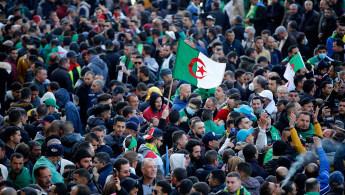'France, Morocco and political fragility': Why is Algeria holding presidential elections early?
Algeria has announced that it will hold presidential elections earlier than usual, sparking suspicion about the state of political rule in the North African country.
The brief release published on Thursday, 21 March, reads: "It was decided to hold an early presidential election, scheduled for Saturday, 7 September 2024. The electoral body will be convened on 8 June 2024."
However, it did not further articulate the reasons for advancing the elections by three months.
The announcement was made shortly after a meeting chaired by Algerian President Abdelmadjid Tebboune, attended by the Prime Minister, the heads of both chambers of Parliament, the Chief of Staff of the Army, and the President of the Constitutional Court.
The decision has stirred up a storm in the country, prompting thousands of commentators to express their confusion on social media using the hashtag "Ma fhemna walou" ("We didn't understand anything").
Local media has shied away from delving into speculations on the surprise announcement amid the dire state of freedom of speech and the mass arrests of journalists and human rights activists in the country.
While advancing the election date under the Algerian constitution is perfectly legal, it's not common for the country's leadership to do so.
This would be the second time that the North African state held an early presidential election. The first time was in September 1998. However, President Liamine Zeroual asserted he would not be a candidate then.
Thursday's statement has not contained such clarification. However, many commentators already assume President Tebboune will not seek a second term.
"We don't have a crystal ball, but as things stand, Tebboune will not be a candidate," wrote Samir Larabi, a university professor and journalist, in a Facebook post, who assumed that the position stems from a "fragile position" of Algiers.
But who would be the candidates for Algeria's presidency?
After the Hirak, Algeria's uprising, the state retracted to an authoritarian rule where the army maintained influence, just like under the ousted President Abdelaziz Bouteflika.
Today, Tebboune, 78, stands alone in the political scene while his opponents remain jailed or exiled.
The only rival candidacy announced so far is Zoubida Assoul, a lawyer and leader of the Union for Change and Progress (UCP), a small opposition party.
However, she must collect the signatures of 600 elected officials or 75,000 citizens to qualify for the race.
Merci à tous ceux qui soutiennent notre vision pour l'Algérie. En tant que candidate à la candidature, je suis déterminée à défendre les intérêts de tous les Algériens et à construire un avenir meilleur pour notre pays.Restons mobilisés pour le changement positif. #algerie #merci pic.twitter.com/wmgEwGp9jY
— Zoubida Assoul 2024 زوبيدة عسول (@UCP_DZ) March 23, 2024
Advancing the elections will make her mission and that of any potential candidate harder – which has led to speculation that the announcement from the presidential palace was set to catch opponents off guard and ensure Tebboune's victory.
Meanwhile, some North African analysts speculate that the early elections are "another episode of Moroccan-Algerian rivalry."
"The presidency in Algeria understood that France, and notably President Macron, was turning away from Algeria to try to reconcile with Morocco and that a visit by the French president to Morocco was announced after Ramadan," added Kader Abderrahim, an expert in the Maghreb, in an interview with RFI.
Algeria's Tebboune is set to visit Paris "late September, early October." Holding an election in December would have meant having an Algerian president nearing the end of his term on an official visit to Paris – a president with no mandate to negotiate better terms with Parisة and with the risk of being accused of seeking the support of his country's former coloniser.




 Follow the Middle East's top stories in English at The New Arab on Google News
Follow the Middle East's top stories in English at The New Arab on Google News

![A group of Palestinians, foreign and Israeli activists gather to participated in an olive picking event on the land in the town of Battir, which is under threat of confiscation by Israel in Bethlehem, occupied West Bank on 8 November 2024. [Getty]](/sites/default/files/styles/image_330x185/public/2182930803.jpeg?h=199d8c1f&itok=__0LgGsa)
